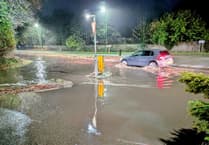Spring has sprung, if a rather soggy start. But the birds have been building nests for several weeks as it’s been a milder than normal winter.
The RSPB says that one of the impacts of climate change is that birds are laying eggs as early as February.
It is therefore timely to remind people, particularly dog owners, of the regulations that are in force at Frensham Ponds and the Farnham Heath – both areas that are very popular with dog walkers.
Dogs must be ON A LEAD AT ALL TIMES around Frensham. Nor must they or people go into the water AT ALL.
This is because there are nesting birds in the reeds that are frightened off nests by dogs crashing around.
The other reason is that many dogs have tick repellent that kills ticks and fleas but it is very effective at killing insect in the ponds. No insects means no fish which means no birds or bats.
Between March and September, the whole area of heathland is restricted and DOGS MUST BE KEPT OUT OF THE HEATHLAND.
There is new signage around the pond this year explaining what the rules are.
The same rules apply at the Great Pond regarding dogs. Farnham Heath, along The Reeds Road, has two fenced-off reserves run by the RSPB.
Some dog owners think they are designated play areas for their dogs. They aren’t. They are important protected areas for ground nesting birds and rare local birds like the Dartford Warbler, Nightjar and Woodcock.
These reserves have always been properly signed at every gate and along the paths but some “entitled” dog owners pull down the signs. There are areas outside the reserves where dogs can be let off a lead.
Regarding dog poo – pick it up, bag it and take it home or put it in a dog waste bin. The “stick and flick” approach isn’t acceptable in heathland.
The number of dogs and quantity of poo that is being left in the undergrowth is increasing the nutrients in the ground and that is changing the soil that certain plants in the area rely on to keep it a heathland.
It is also an unpleasant health risk to people and other dogs.
One presumes that people visit these wonderful wildlife areas because they are so beautiful, but if they are abused, they will cease to exist.
Hopefully the responsible dog owners and members of the public will advise irresponsible owners of the regulations.
Failing that, under the Wildlife and Countryside Act 1981, harming a single bird, nest or egg, can result in an unlimited fine, up to six months in jail, or both.
By Colin Shearn
Tilford





Comments
This article has no comments yet. Be the first to leave a comment.